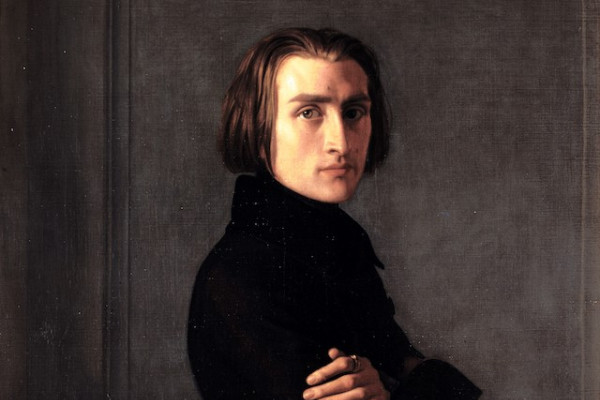The trajectory of Franz Liszt resembles that of a hero from an epic tale that his friend Victor Hugo could have narrated. Both men embraced their century as much as they were enveloped by it.
After early beginnings as a child prodigy in the Vienna of Schubert and Beethoven, young Liszt became in Paris the greatest piano virtuoso and, at the same time, one of the first stars in the contemporary sense of the term, combining success and scandal, celebrity, tumultuous loves, and incredible friendships. After an international tour of nearly 8 years, he changed his life and transformed into a conductor, theatre director, promoter of the avant-garde, and composer of great symphonic works. He simultaneously developed a profoundly original aesthetic thought on music.
Finally, propelled by his deep Catholic faith, he drew closer to the Pope, received minor orders, and composed masterpieces for the organ and religious music. Not forgetting to be a beloved professor recognized by his numerous students for his unwavering generosity. These are the main facets of this exceptional man, whom chance has made a genius, whose portrait we will paint in words, images, and music during this conference.
Hugo Rodriguez is the curator of the library of the Royal Conservatory of Brussels. He has previously worked at the Royal Library of Belgium (KBR) and the Museum of Musical Instruments (MIM). He holds a doctorate in musicology from the Université libre de Bruxelles, where he teaches, and is the author of a PhD on the question of meaning in music, viewed from the perspective of history, philosophy and cognitive science. He is also conducting research into comedy in music and Belgian musical life. He was one of the curators of the exhibition Toots 100: The Sound of a Belgian Legend and has co-organised other projects (symposiums, conferences, concerts and publications) to mark the centenary of the birth of Toots Thielemans.
Liszt started life as a child prodigy at the Vienna school of Schubert and Beethoven and went on to become the greatest piano virtuoso in Paris and one of the first stars in the contemporary sense of the term, combining success and scandal, celebrity, turbulent loves and incredible friendships.
After an international tour that lasted nearly eight years, he changed his life and transformed himself into a conductor, theatre director, promoter of the avant-garde and composer of great symphonic works. He simultaneously developed a profoundly original as well as aesthetic way of thinking about music.
Finally, propelled by his deep Catholic faith, Liszt drew close to the Pope, received minor orders from the papacy and composed religious music, while never forgetting to be a beloved professor recognized by his numerous students for his unwavering generosity.
The portrait of this exceptional man was presented to us; by Hugo Rodriquez, the curator of the Royal Conservatory in Brussels, who holds a doctorate in musicology from the Université Libre de Bruxelles, where he wrote his dissertation on...Liszt.
The speaker introduced his lecture with the following:
“Everybody knows that Liszt was a great composer, very prolific, whose works are performed regularly. Millions of music lovers are familiar with his Hungarian Rhapsodies or La Campanella. He lived long and had a prolific life.”
Franz Liszt was born in the Hungarian part of the Habsburg realm, 80 kilometres from Vienna. His father played a very important role in his life. He was deeply religious; he was an amateur cello player; and he noticed the musical talent of his son from an early age. Franz Liszt gave his first concert at age five, and this led to his receiving financial support from rich sponsors. His father decided to take his family to Vienna.
In Vienna, Liszt studied with the outstanding composers of the age, Karl Czerny and Antonio Salieri. He continued giving concerts and had much success, which encouraged his father to take him to Paris in the hope that his son could enter the Paris conservatory. To their great disappointment, it turned out that the Paris conservatory under the directorship of the Italian composer Cherubini did not accept foreigners.
Therefore, Franz’s father engaged two tutors for his son. When Liszt was only 14, his father unexpectedly died, and Franz and his mother were left without means. Those years were the hardest in his life. He went through three crises: an artistic crisis, an emotional crisis when his first love with a girl was prohibited by her father, and a religious crisis.
As a young man Liszt was obsessed with religion and wanted to become a priest after his failed love affair.
He was saved by the French Revolution of 1830. It brought about a change in his character and in his way of life. He became the fashionable pianist of Paris integrated in elite circles.
In this period, we could say that Liszt was handsome, and women were attracted to him. He travelled around cities in carriages pulled by white horses. His piano technique had no boundaries and he enjoyed playing while holding a glass or a cigar in his hands. Big crowds were waiting for him after the concerts.
In 1833 he met Marie d’Agoult who was six years older and married with children. She was a friend of George Sand, and a writer.
Our speaker cited Liszt’s description of her appearance with the conclusive words: ”She was an angelic beauty”.
Their love affair flourished. It was scandalous and to escape rumours they decided to leave Paris for Switzerland and Italy. They had three children together, among them Cosima, who later became the wife of Richard Wagner.
The next eight years Franz Liszt spent on the road, giving non-stop concerts in many countries. His was one of the biggest concert tours in music history. They say that he gave 2000 concerts. That was unheard of. The public went crazy. The term ‘Lisztomania’ was invented.
Our speaker read us letters describing these events. At his concerts, Liszt usually introduced local melodies and the audience loved it. He also engaged a public relations manager, who was responsible for advertisements and relations with the press. Liszt developed a business of merchandising his life.
Once, when Liszt was in Paris, the Russian Tsar Nicholas I, I asked him to give a concert on the eve of the anniversary of the Borodino battle, which was decisive in Napoleon’s failed invasion of Russia. Liszt refused on the basis of his pride as a Frenchman. Then during another concert by Franz Liszt, the Tsar started talking to his neighbour. The musician stopped playing and left the podium. When he was asked why he has done so, he replied, “because we must all be silent when your majesty speaks.”
Liszt as virtuoso was involved with piano makers. They tried to invent better models, with easier to press the keys.
Franz Liszt invented master classes. They were his own specific way of teaching musicians. He also invented recitals as a means to say something personal about yourself, about the piece of music you perform. He called such pieces transcendental.
The speaker showed us a small advertisement of 1840 from London inviting the public to “Music and drama. Recitation". That meant that the musician was a narrator, not only an entertainer.



